Snooker: Does the sport need a shot clock?
Yahoo Sport's snooker expert Nick Metcalfe wonders if time limits on players will keep impatient fans happy or whether tactics, break-building and safety are aspects of the game to be treasured and encouraged

Let’s clear one thing up for starters, shall we? Everybody likes seeing quick-fire, exciting snooker.
Who didn’t love Alex Higgins helping to bring the game to the masses in the 1970s and 1980s with his outrageous flamboyant playing style?
Whose heart didn’t sing when Ronnie O'Sullivan cleared the table for that incredible maximum break in five minutes, twenty seconds?
Which one of us hasn’t enjoyed watching O'Sullivan trading blows with Barry Hawkins at the World Championship over the past couple of days? The two players compiling big breaks, winning frames in a single visit, pulling off scintillating pots.
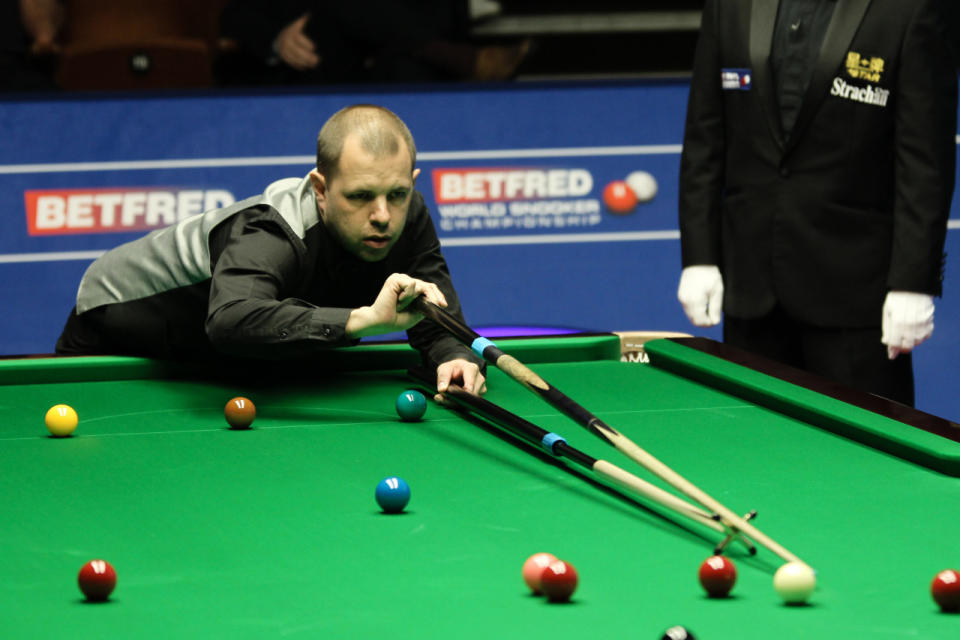
Barry Hawkins in action against Ronnie O'Sullivan at the Crucible this year
But that’s not the whole story with this sport, and surely never will be. There is also room for tactical battles and excellent safety shots. For players taking their time at the table where appropriate.
And whisper it quietly, there’s even a place for players struggling too. I watched the second session of the second round match between Ding Junhui and Judd Trump on Sunday night, and it’s fair to say both were far from their best. But it was still fascinating fare, watching these great stars of the game scrapping it out for a prized place in the last eight of the tournament.
When Graeme Dott played Peter Ebdon in the 2006 Crucible final, some fans were said to be put off by the pedestrian pace, and the long grinding safety battles. The match finished at just before 1am. But isn’t that all just a part of snooker too? You might as well be a football supporter and get annoyed that every game doesn’t finish 3-3.
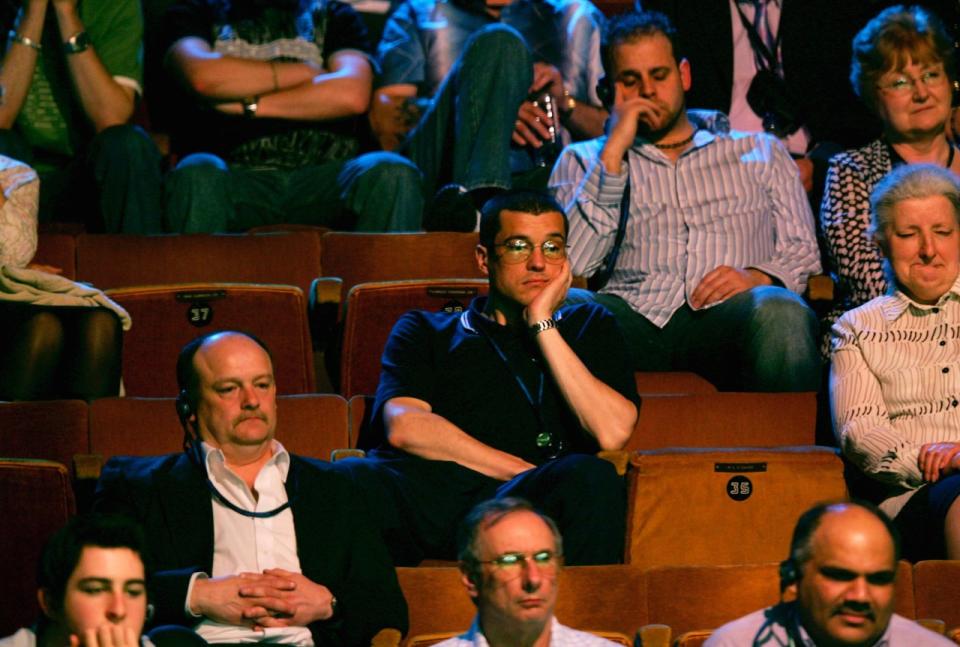
Fans (and empty seats) watching the Graeme Dott v Peter Ebdon world final in 2006
When I think back to Stuart Bingham’s wonderful world final win over Shaun Murphy last year, I think about the century breaks and the brilliant potting, Bingham’s 147 attempt and his nerveless clinching of a famous victory. But I also recall the gripping 31st frame that lasted over an hour, so long in fact that Bingham asked the referee if he could pop out to the toilet during it.
Surely we don’t want all players to be as quick as Tony Drago, or Jimmy White in his pomp, and for everyone in the sport to take on every unlikely long pot going?
Take a look at Alan McManus at the Crucible this year. The 45-year-old doesn’t tend to score as heavily as many of the top players now, but his clever snooker brain and shrewd tactical play ensure he’s still highly competitive. And the Masters champion of 1994 is still in there fighting in Sheffield, with a quarter-final match to come.
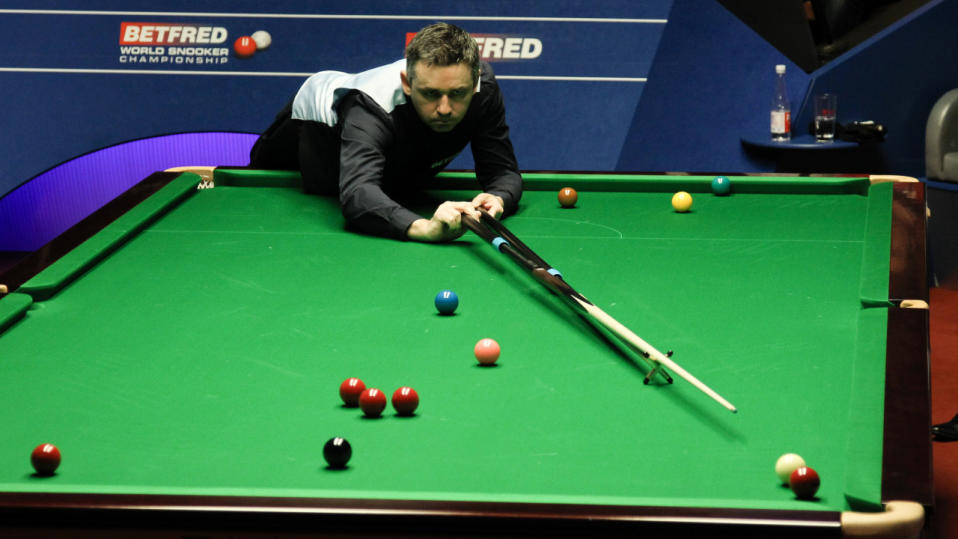
Alan McManus still has a great snooker brain
And yet, we live in an age of speed. It’s just an unavoidable truth now, and there’s no point in denying it. The age of digital technology seems to have handed us all a life with the fast forward button permanently pressed down.
The millennial generation, who we seem to hear so much about these days, just haven’t got the time or inclination to sit through hours of action, whatever the sport, or so they tell us.
Which is why there is a genuine live issue over the speed of shots played in snooker. Several leading figures in the game have come out and said they would like to see a shot clock introduced into the sport.
It isn’t a particularly new thing either. Back in 2011, Trump - one of the most charismatic players in the sport - told me he wouldn’t be against a shot clock being introduced at the UK Championship and Masters, two of snooker’s three biggest tournaments.
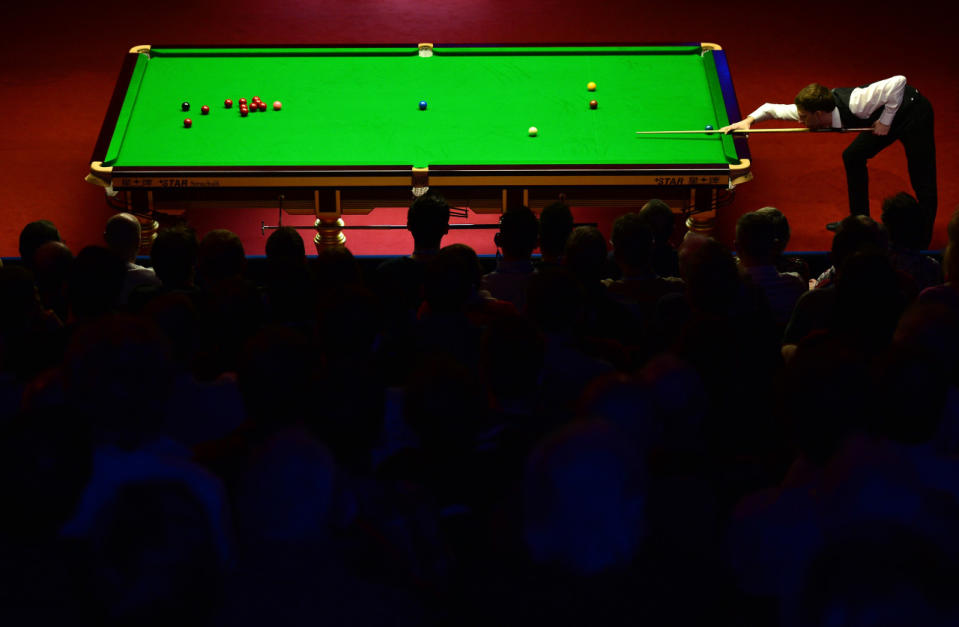
Judd Trump at the table - hurry up!
‘I find snooker boring sometimes,’ he said. 'People walking round the table taking two minutes to take a shot when they don’t need to. I can see why people switch off the television. I’m not against events having a shot clock.’
But 1986 world champion Joe Johnson was quick to disagree, telling me: ’(A slower game) is a connoisseurs’ type of snooker.
‘It’s OK for Judd to say about a shot clock because he’s so fast and exciting, but eventually you slow down and need more time to think about the shot.’
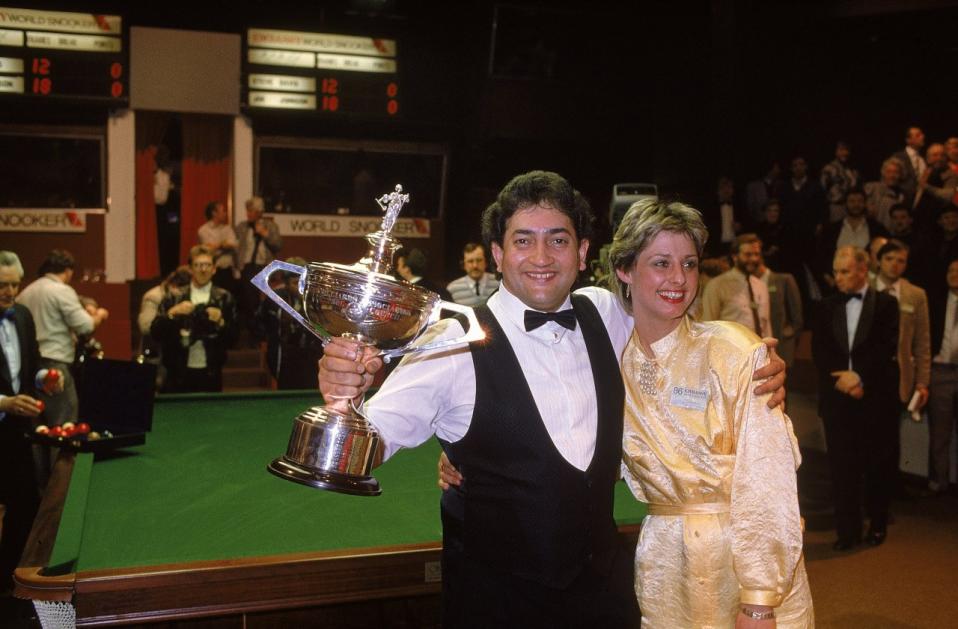
Joe Johnson celebrates his world title win in 1986
Just before this current World Championship, 2005 Crucible winner Murphy told BBC Radio: 'I think it’s time that we changed a few rules. I’m personally very much in favour of bringing in a shot clock to tournaments. Nothing silly, just something to encourage players to get on with it a little bit more.
'I think it’s definitely time for snooker to consider looking at other formats, a bit like cricket did with the Twenty20.’
But John Parrott, the 1991 world champion, put the other side of the case, saying: 'The wonderful thing about this game we have is that there are different ways to play it.
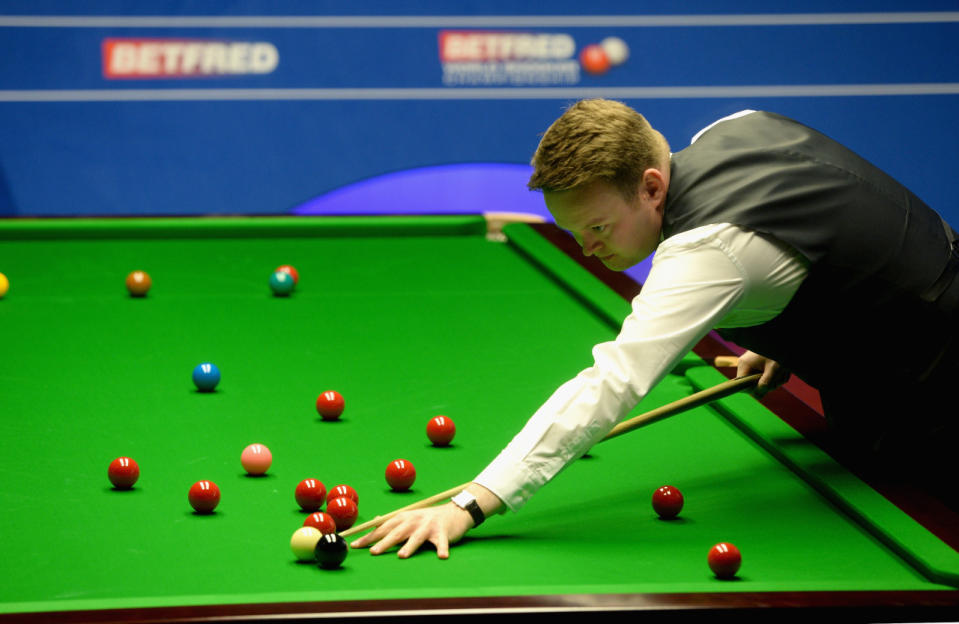
Shaun Murphy in action at the Crucible this year
'It’s filtering out now anyway (a slower style). For most of the modern players the game is attack minded. But I enjoy watching the tactical game. That makes it fascinating for me.
‘It’s all part and parcel of what makes snooker brilliant. I don’t want to see 60-minute frames every single time, but every now and again - like we saw in the world final last year - it’s exciting.’
It’s probably fair to say that traditionalists - and generally speaking I fall into that camp - would never want a shot clock brought in, particularly at the game’s landmark events.
I actually don’t think slow play is as pressing an issue as some suggest. Certainly not when you compare with golf, where two of the sport’s new 'Big Three’ - Jordan Spieth and Jason Day - often play at a snail’s pace.
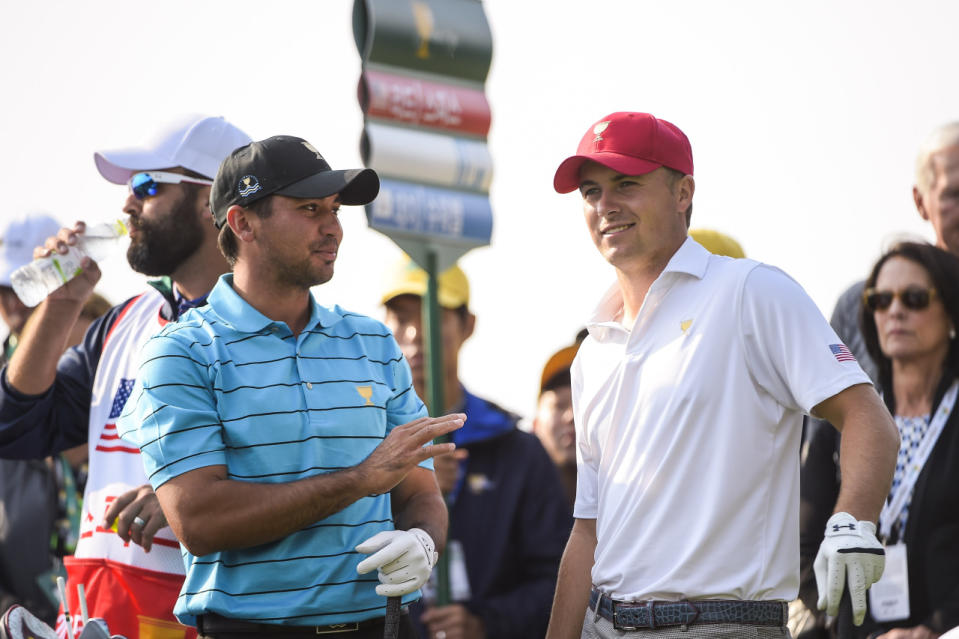
Jason Day and Jordan Spieth at the 2015 Presidents Cup - they won't be rushed
As Parrott said, an old-style, more tactical approach, is generally a thing of the past. The shots that most modern players take on are often incredible to see for those of us that remember the 1980s. Everything in the game seems pretty much set up for big breaks and entertaining fare.
And surely there are some situations that demand a player uses up plenty of thinking time, if they’re faced with trying to escape from a difficult snooker for example.
However, no sport should stand still. Well, they can’t afford to really. If all our beloved games were left to us traditionalists, not much would ever be altered. There would probably have never been Twenty20 in cricket for one thing - and look what a stunning success that has been.
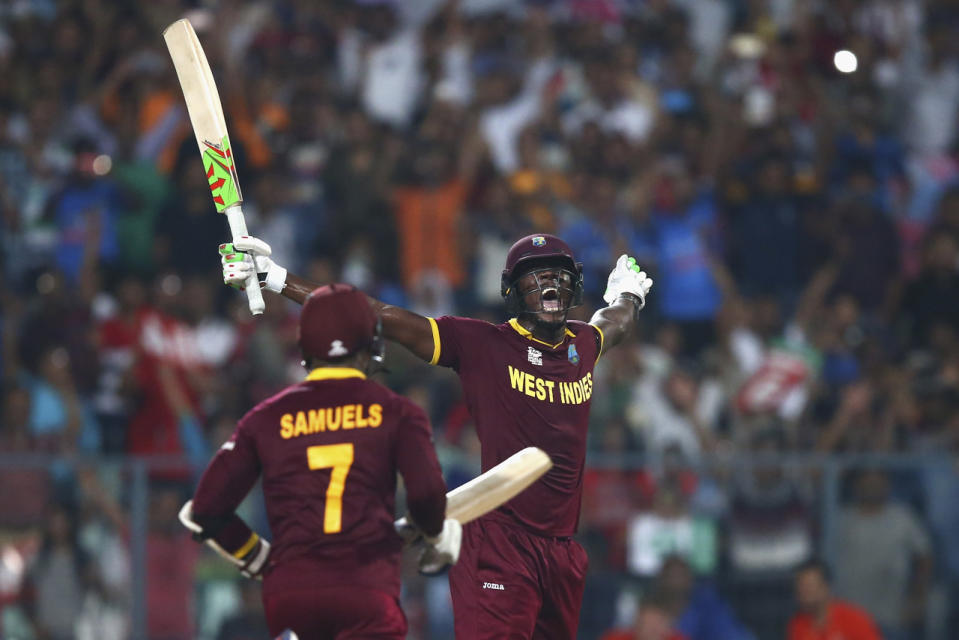
Carlos Brathwaite celebrating at the recent England v West Indies World Twenty20 final
Perhaps the solution, to start with anyway, is an experiment at two or three of the smaller ranking events next season. The referee could give a gentle reminder to a player if he’s spent, say, 90 seconds or two minutes on a shot.
Further down the line, an official warning could possibly be given for persistent offending, with penalties incurred for further transgressions.
Just an idea of course. The way I see it, if some of snooker’s biggest stars of today are calling for a shot clock, it’s a bit rich for those of us sitting on the sidelines to be so sniffy about it.
Golfers are frequently warned about slow play after all, and that doesn’t seem to affect the enjoyment level for fans of that sport too much.
It should be noted that snooker does already have a special Shoot-out tournament, which took place earlier this year in Reading.
That event features a host of new rules, including a shot clock, which are designed to showcase the sport in a fresh and dynamic way.
In this era of increased competition, snooker must always ensure it offers as impressive and efficient a package as it can to fans and broadcasters.
The sport’s authorities are quite clearly aware of this too, hence a new rule introduced during the current season that limits the number of times a player can leave the arena to go to the toilet during matches.
One thing is for sure, snooker fans won’t be short of an opinion on this subject. So where do you stand?

 Yahoo Sport
Yahoo Sport 





































